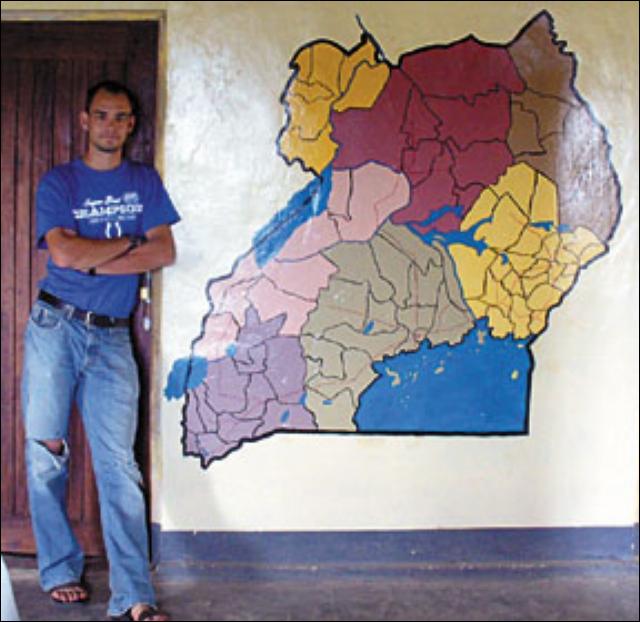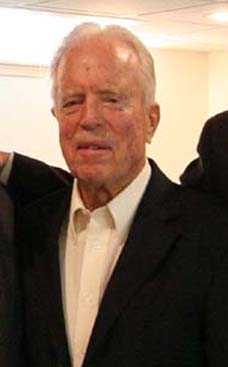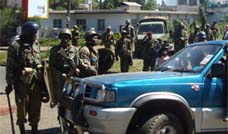
After class I spend some time talking to Frances. He tells me that as a teacher he makes 200,000 Ush a month. $114. Less than $4 a day. That’s about one-third of what I make on my very modest Peace Corps salary. There are times when teachers will go months at a time when their salaries are delayed. He also tells me that teacher’s pay is supposed to increase with experience, but to get that raise you have to submit forms to the local government. So far, he tells me, none of his forms have been approved for a raise in the last 5 years.
Brian Dunn writes: Visiting a school in Uganda
Visiting a school in Uganda
Brian Dunn
For the Republican
(Editor’s note: Brian Dunn, formerly of Rushville, is serving with the Peace Corps in Uganda.)
“Who can calculate the area of this shape? Giftee?” As Gift goes to the board the teacher uses a piece off a foam mattress to erase another section of the blackboard. “In 1/2 h(a x b), what is h, class?” A few students blurt out the answer. “Ah, ah…” the teacher says then mumbles something in the local language to the extent of, “You should raise your hands instead of speaking out of turn.”
A while back I decided to visit one of the area primary schools here in Uganda. It’s approximately four miles from the Compassion center where I work. They have 746 students and 15 teachers (a 50:1 students/teacher ratio.) There are 12 classrooms for the eight grades. The school is free for the students, the government pays the teachers salaries, but parents are asked to pay 8,000 Ush per year ($4) for additional projects, such as the new construction.
I began my visit with the seventh graders (P7 students). These are the oldest students in the school. They can be anywhere from 11 to 19 years old. The students all stand upon my entering. They are all wearing their school uniforms: pink shirts with navy blue shorts or skirts. The head teacher is teaching and they are doing a section on graphing. No text books and the teacher is teaching in English. There are just under 60 students in a smaller than normal (by U.S. standards) sized classroom. The students sit three to a desk A blackboard is in the front of the class with a large piece of paper taped to the board with an x & y axis and grid. The students are learning coordinates (3, -2). Most of the kids have shoes on here, which is a general indication of both their age and poverty level.
“Who can name the shape?”
“A triangle,” a student replies.
“It is a special shape. What shape is eeet?”
Class, in perfect unison, “A right angled triangle.”
There is no ceiling in this classroom, only an aluminum roof which means when it rains it’ll be almost impossible to teach due to the noise. Even a light rain creates a great deal of noise on a metal roof! The students take meticulous notes in small notebooks. They use newspaper to create covers for their notebooks for decoration and protection.
I then shift to the P4 classroom. I can smell the multitude of kids upon entering. It’s a musty smell of mud huts, feet and bodies. It’s a smell I’m accustomed to from living here As I enter, the kids again stand and I’m greeted to the all too familiar: clap clap clap-clap-clap, Clap! I immediately notice several of our Compassion kids. I’m seated again in the back of the classroom next to Immaculate Harriet, one of my favorite little girls from Compassion. She has severe burns over 90 percent of her body from a house fire where she hid under the bed while the house burned. Despite her disfigurement she has one of the most beautiful smiles of any child I’ve seen in Africa and she’s a good athlete as well. Her little hands are misshapen and her fingers curl up. She has to hold her pen in a special way between her fingers just to write, but she’s worked hard to overcome her limitations.
This room has around 80 students in it and is a little bigger than the previous classroom. Far less shoes here. I greet the class and tell them I’m happy to visit them.
“Reproduction in baads. Reproduction in what? Baads (birds). How do we call a male baad?” the teacher begins.
Class, “A cock.”
“And a female baad?”
“A hen.”
The teacher is a man called Frances. He teaches mostly in English but often repeats himself in Runyankore.
After class I spend some time talking to Frances. He tells me that as a teacher he makes 200,000 Ush a month. $114. Less than $4 a day. That’s about one-third of what I make on my very modest Peace Corps salary. There are times when teachers will go months at a time when their salaries are delayed. He also tells me that teacher’s pay is supposed to increase with experience, but to get that raise you have to submit forms to the local government. So far, he tells me, none of his forms have been approved for a raise in the last 5 years.
Finally I head to P1 class. “Hello Saa (sir). You ah wel-o-come,” the children greet. My nostrils are again met with the all too familiar scent. It’s a small classroom. The desks seem to be bigger but maybe that’s because the kids are smaller. Sixty kids. One teacher. Same uniforms. The alphabet is written in chalk across the top of the blackboard. The door is labeled with the word “door.” The walls are mostly bare. The only poster in the room is one which says, “Days of the week.” Every time I look up from note taking there are at a minimum a dozen pairs of eyes on me. The classroom is located immediately next to one of the school’s two latrines (out houses). When the wind picks up I’m smacked in the face with the odor. No doubt this is why P1 is at this end of the school.
This class is taught in the local language. I recognize some of the words on the board. The P1A teacher is called Jolly. It took her repeating it three times before I understood. She was patient enough for me to get it right. A sign of a good teacher! Jolly asks for any student to come up and read a simple sentence in Runyankore. A wave of hands go up. A few students stand and others grunt, “mmm, mmm…” Young Boaz approaches the board, points a stick way up high to what he’s reading. “Mariira nebigambo byawe.” They read it just like any first grader would read it. Sounding it out with mistakes along the way.
The teacher smiles a lot as she teaches as if she is amused at some of the student’s responses and she is pleased to teach them. There is a lot of repetition in what they are doing. There is a lot of audible learning “Ente zituha amate.” Aha! I know that one! “Cows give us milk.”
“Who can erase the board for me?” is what I think the teacher says. Two boys sprint to the front and grab pieces of foam and rub the board as if the winner gets a prize. They erase as high up on the board as they can reach. The teacher finishes the job and writes “English” across the top. “Now go to number two. Go to number…? Two.” When teaching English the teacher speaks entirely in English. “We say one boy but two _____.” “We say one house but six _____.” When a student is incorrect the teacher says, “Is it? You are lying.” Which may sound harsh, but it’s a common thing to say in the local language. When a student goes to the board and fills in the blank correctly they receive their reward: Clap clap clap-clap-clap, Clap!
As I’m preparing to leave the school I see the kids eating their lunches. A number of kids run home for lunch. Many of them have brought small plastic buckets with leftovers from supper the night before. They share lunch with friends and siblings. I see mostly starchy foods: potatoes, cassava, sweet potatoes, without much, if any, protein.
Comparing education in the U.S. with education here is like comparing apples to oranges. Uganda should be praised for their free primary and recently free secondary education for all. Knowledge is power, and for a country to overcome the poverty trap, it must have educated citizens. But with so many schools and so many students and so few teachers and resources there is still a void to be filled.










